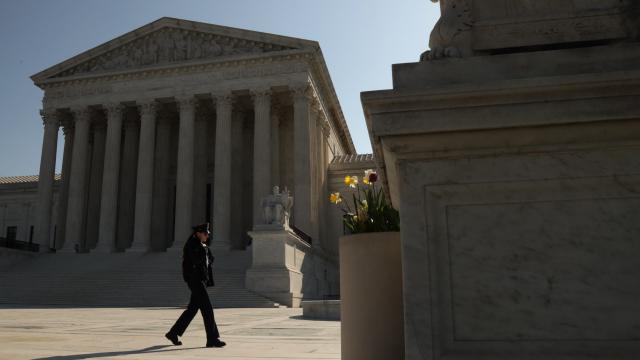The Wisconsin state Supreme Court on Monday blocked Democratic Governor Tony Evers’ last-ditch effort to halt primary elections on Tuesday, ensuring that in-person voting will commence tomorrow despite the coronavirus pandemic. Meanwhile, the U.S. Supreme Court shot down extended absentee voting deadlines in a separate case.
For weeks, Evers had urged the state to took no action, and on Monday, Evers sent out an eleventh-hour executive order to delay the vote until June.
Per the Washington Post, whether Evers had authority to delay the election unilaterally wasn’t totally clear”and the conservative-dominated state Supreme Court ruled 4-2 the answer is no in this case, though it only issued a brief explanation of the ruling. (It says it will issue a more detailed explanation later.) In another blow, the U.S. Supreme Court has also reversed a lower court ruling that extended the deadline for absentee ballots to be counted by six days.
SCOTUS, which is also majority conservative, found in a 5-4 ruling matching ideological lines that extending the absentee ballot deadline “would allow voters to mail their ballots after election day, which is extraordinary relief and would fundamentally alter the nature of the election by allowing voting for six additional days after the election.”
[referenced url=” thumb=” title=” excerpt=”]
The ongoing covid-19 pandemic has hit Wisconsin hard, and the state is facing a massive shortfall of poll workers prepared to carry out the election on Tuesday. That means much more limited numbers of polling sites are expected to be available, crowding more voters into a smaller number of locations.
In Milwaukee, which normally has 180 voting sites, the Milwaukee Journal-Sentinel reported in late March that a dozen or less were expected to be available. That number is now down to just five, with turnout expectations of up to 50,000. Statewide, hundreds of municipalities are so short on poll workers they can’t open even one voting location, while hundreds of others are still short or have had to consolidate sites.
Combined, the state and federal rulings will ensure that election officials have to toss out thousands of absentee ballots that aren’t received or postmarked by Tuesday, while health concerns, lines, and bewildering changes to the location of poll sites will keep countless others from casting votes.
“This is it,” Evers told reporters on Monday before the state Supreme Court ruling, per the New York Times. “There’s not a Plan B, there’s not a Plan C. We believe the Supreme Court will support us on this.”
Madison Mayor Satya Rhodes-Conway tweeted that the state court ruling was “unbelievable” and “hyper-partisan,” allowing Republicans in the state to push through a “reckless election that is certain to disenfranchise tens of thousands of voters.”
Unbelievable. Wisconsin’s hyper-partisan Supreme Court is barreling ahead with a reckless election that is certain to disenfranchise tens of thousands of voters. To find your polling place #Madison please use this map. https://t.co/ny7NBaA0jJ
— Mayor of Madison (@MayorOfMadison) April 6, 2020
Keeping the election on Tuesday could help spread the novel coronavirus, with over 2,500 confirmed cases and 85 deaths already reported in Wisconsin as of Monday evening. Wisconsin is the only out of 11 states with April primaries that has not shifted to vote by mail or imposed a delay.
The lower turnout, however, could help tilt the election towards GOP candidates. Per the New York Times, while in some states Republican governors and secretaries of state have moved to increase voting by mail, the GOP has sought to portray efforts to boost absentee voting and delay elections in battleground states like Wisconsin, Michigan, and Pennsylvania as Democratic power grabs. As the Post noted, Wisconsin Republicans conveniently had a differing opinion in 2018, when they contemplated moving the date of the Democratic primaries to ensure a lower turnout for conservative state Supreme Court Justice Daniel Kelly’s bid.
The $US2 ($3) trillion federal pandemic bailout passed last month includes $US400 ($657) million in funding for states to minimise election disruption during the pandemic. But Republicans in Congress that have generally fought for tighter voting restrictions and Donald Trump, who has fabricated allegations of massive Democratic voter fraud out of thin air, successfully removed provisions from the bill that would have required states to expand mail-in voting and mail ballots to every voter during a national emergency.
“I think a lot of people cheat with mail-in voting,” Trump said at one of his daily pandemic briefings (which the president has turned into de facto campaign rallies) last week. “It should be you go to a booth and you proudly display yourself.”
Richard Hasen, a professor at the University of California at Irvine’s School of Law, told the New York Times that “We know that voter fraud, while very rare, more commonly occurs with absentee ballots than in-person balloting.”
But he suggested that opponents to mail in voting may be more interested in suppressing turnout: “While there are legitimate reasons to worry about increased vote by mail, it’s not legitimate to fear increased vote by mail because it means that more voters would be able to vote.”
